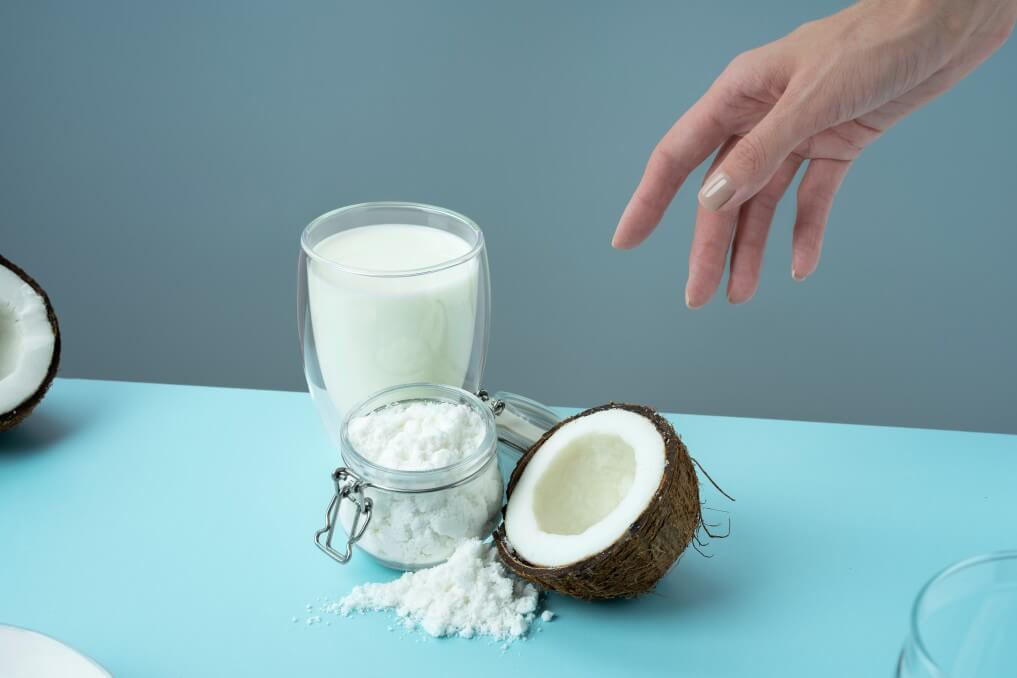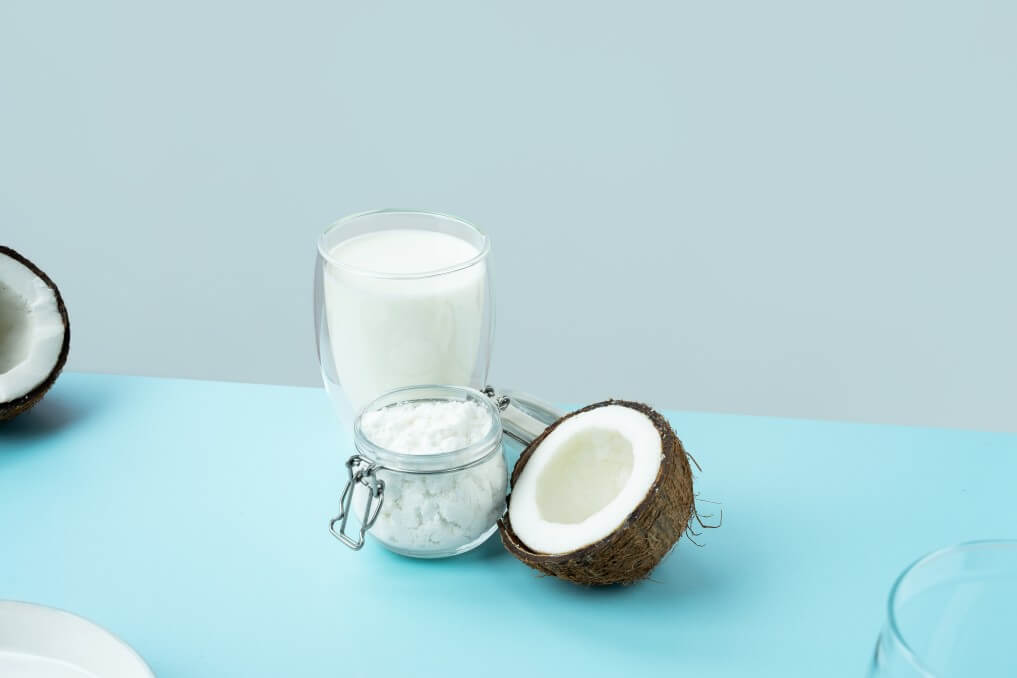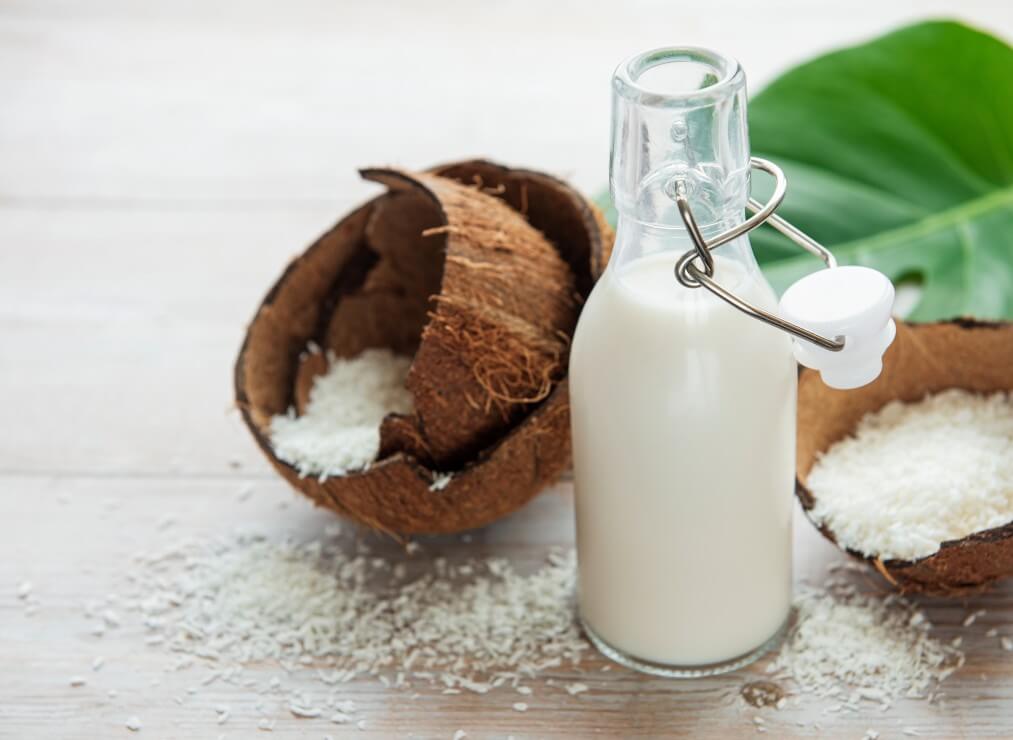Coconut Milk
Weight Loss
Coconut milk has MCTs, which have been linked to weight loss.
Allergen-Friendly
Coconut milk is free from common food allergens like nuts, gluten, and soy.
Heart Healthy
Studies have shown coconut oil can increase your good cholesterol levels.
Who needs milk that's easy to make at home, is gluten and lactose-free, and tastes delicious? Everyone does, obviously.
Coconut milk is not only super tasty but pretty good for you, plus it's one of the easier plant-based milks to get in stores and it's super convenient to use as a dairy substitution in foods and drinks.
But what exactly is it about coconut milk that makes it so popular? And surely you can't just make it at home yourself?
Here's everything you need to know about coconut milk.
What is Coconut Milk?
The coconut is a member of the drupe family of fruits, which includes plums, peaches, avocados, and mangoes. The tropical and subtropical treat differs from its brothers because it has a hard outer shell and an edible, soft center.
The coconut actually contains a significant amount of sweet juice rather than a pit or kernel. Coconut milk is a juice made by soaking grated coconut flesh in boiling water and pressing it through a sieve. Many people confuse it with coconut water, but they're very different.
Coconut milk is basically an emulsion of ground coconut meat and about 50% water, though that ratio differs based on the product.
Not only does it taste great in curries, beverages, and desserts, but it also has many health benefits.
Coconut may offer anti-inflammatory and antibacterial properties, according to preliminary evidence. It also contains a lot of vitamins, minerals, and "healthy" fats that are easy to digest and absorb by the body.
What Does Coconut Milk Taste Like?
As the name suggests, coconut milk tastes like coconuts, and it is quite distinctive in its taste. The best kinds of brands of coconut milk are also creamy and rich in terms of texture. The thinner varieties will also have a slightly less distinct coconut flavor.
- Coconut Milk Taste: Sweet, like coconut.
- Coconut Milk Texture: Rich and creamy.
Coconut Milk Nutrition Facts
Coconut milk is high in vitamins and minerals, though the nutritional value varies depending on the type. Cans of coconut milk, for example, have a different nutritional profile than coconut milk drinks.
Here are the nutrition facts for coconut milk, courtesy of the USDA.
Coconut Milk Nutrition Facts | |
|---|---|
Calories | 150 |
Protein | 2g |
Fat | 15g |
Carbohydrates | 2g |
Sugar | 2g |
Sodium | 25mg |
Commercial producers of coconut milk often fortify their drinks with A, B-12, D2 vitamins.
The Benefits of Coconut Milk
Coconut milk is not only widely available and relatively inexpensive compared to other plant-based milk varieties, but it also has a host of other benefits to consider.
Lactose (And Kind of Everything) Free
Coconut milk is both gluten-free and lactose-free, which makes it ideal for people struggling with conditions linked to the consumption of dairy or grain-based milk.
It is also nut-free, unlike almond, hazelnut, or cashew milk, making it ideal for those with nut allergies.
Could Promote Weight Loss
Coconut milk has a set of medium-chain triglycerides (MCTs), which research has linked to weight loss.
Essentially, MCTs stimulate a process called thermogenesis, or heat production. This heat production can help reduce waist size and body weight when combined with other healthy diet options and exercise.
While coconut milk has a relatively high-fat content, these are saturated fats, and different sources of saturated fats play different roles in the body.
Genetics can also play a role in how the body metabolizes saturated fats and the extent to which these impact our health.
Good for the Heart and Body
Some studies have shown that coconut oil particularly can increase levels of good cholesterol, which can help protect the heart by removing "bad cholesterol" in the body.
Coconuts have lipids in them, otherwise known as lauric acid, which many scientists believe has a positive impact on the immune system. According to some studies, lauric acid appears to have antibacterial and anti-inflammatory properties.
Coconut milk can also be helpful in combating insulin resistance and diabetes through the use of ALCs (amylose-lipid complexes).
The Downsides of Coconut Milk
As much as we can sing the praises of the humble coconut, we do still need to consider some key points. These need to be considered when deciding whether to bring coconut milk into your diet.
Could Cause Digestive Discomfort
Coconut has a lot of fermentable fibers in it, which are great for some people, but not so great for others.
Fermentable fibers feed the good bacteria in our guts and encourage the creation of short-chain fatty acids, which are a significant source of fuel for our guts and intestinal cells.
For some, however, these fibers may be problematic for people struggling with FODMAP intolerance, which is a condition that causes bloating, gas, diarrhea, stomach cramps, and constipation.
For people struggling with FODMAP, it's best to avoid coconut products until the problem is resolved.
May Not Always Good for the Heart
Finally, while we mentioned that coconut milk could have good heart benefits, there are some considerations to take into account.
While coconut products don't affect LDL cholesterol levels, they are high in fat and calories and should be consumed in moderation.
What this means is that some people, called "hyper-responders," may see an increase in LDL cholesterol levels and therefore may do better on a low-fat and high-carb diet.
Keep in mind that most studies are related to coconut oil, which has a significantly higher ratio of fat than coconut milk. This means that while there may be some impact, the effects on cholesterol levels will be less noticeable.
How To Make Coconut Milk
Making your own coconut milk is quick, satisfying, and super simple. This process could use fresh coconut, but we've highlighted how to do this with desiccated or shredded coconut. If you want to do this with fresh coconut, the ratio is 1/2 fresh coconut to 2 cups of water.

Ingredients
- 2 cups of shredded, unsweetened coconut
- 3-4 cups of water (or less for a creamier blend)
- A pinch of salt
- 1 date of 1 Tbsp maple syrup (optional)
- 1/2 tsp vanilla extract (optional)
Equipment Needed
- High-speed blender
- Nut milk bag or cheesecloth
- Bowl
- Air-tight container
Instructions
Step 1
Using a high-powered blender, combine the coconut, half the water, salt, and any optional add-ins.
Step 2
Blend for 2 minutes or until well incorporated.
Step 3
Test the flavor and sweetness and add more add-ins as needed. Ad more water if the consistency is too thick.
Step 4
Place a nut milk bag or cheesecloth over a bowl and strain the milk through.
Step 5
Refrigerate in a tightly sealed container (keeps for up to five days).
Some separation may occur while refrigerated (because there are no preservatives!) but just give it a good shake before use. You can also save the pulp to use in baked dishes, smoothies, or tasty energy bites!
Coconut Milk Recipes
Because coconut milk is so popular around the world, there are plenty of delicious recipes to try using your homemade milk! It's popular in Thai cuisine, but we also wanted to include some ideas for recipes from all over.
Just remember, because coconut milk has a distinctly “coconutty” taste, it isn't always going to be the best substitute for other milk-based recipes (unless you're keen on the idea of experimenting, which we're so down for).

Chinese Raspberry Snowflake Cake
This dish is best served cold, and it's super tasty, which makes it great for hot summer days. This is traditionally made from raspberries, milk, potato starch, and gelatin, but substitute coconut milk and coconut cream in place of the cow's milk options.
It's quick to cook but needs some time in the fridge to set, so plan ahead when you want a bite of this delicacy. You can opt for other fruits like mango, strawberries, or blueberries to make this dessert.
Satisfy your chewy fruity craving here.
Thai Chicken Coconut Curry
This one cooks up in just 20 minutes, which is ideal for busy weeknights. It's low-carb and super nutritious, while still being incredibly comforting and warming.
This is packed with veggies, flavorful herbs, and spices, and you could use it in a pinch to serve to last-minute guests. No one would guess you just whipped it up in no time.
Oh, did we mention that it's a one-skillet dish? Substitute the chicken for tofu, potatoes, or another starchy veg to make this totally vegan. Yum!
Iced Dirty Chai Latte
What's a dirty chai, you ask? It has a shot of espresso added, which works so well with the sweet, creamy, and lightly spiced flavor of traditional chai. We used coconut milk in place of other dairies for that perfect floral flavor, which is ideal for summer.
You can make this as a warm drink as well if you need a little warm-up during the chillier months!
Check out this delicious and refreshing recipe here.

Coconut Milk FAQ
We may think we know a lot about coconut milk already. After all, it's one of the more popular and well-known plant-based milks out there. But let's cover some basics, the things you’d normally have to scour the web for.
Is Drinking Coconut Milk Good for You?
Unfortunately, experts haven't looked into coconut milk and cream as thoroughly as they have looked into other coconut byproducts like coconut oil. Nonetheless, eating or drinking it is likely to have some health benefits.
What we know is that coconut milk may help lower cholesterol levels, can help with weight, and boost your immune system.
Is Canned Coconut Milk Healthy?
We typically regard fresh or frozen foods as more healthy than canned ones. Is this actually true? While fresh and frozen products are great, there is nothing wrong with tinned or canned foods. Canning actually preserves most of the ingredients and nutrients and keeps food that would otherwise go bad fresh as a daisy. Canned coconut milk is no different!
One cup of canned coconut milk has over 10% of your daily iron, magnesium, potassium, and zinc requirements. It's heavy in fat as well, but as we've discussed, it's the kind of fat that's good for you in moderation.
Because of its limited shelf life once opened, canned coconut milk may be a better way to keep your pantry stocked without fear of things going off. However, some studies have shown that the BPA in the lining of a can may move into the food it contains, which can have occasional health effects.
Related: Is There Milk in Coconuts?
Is Coconut Milk Healthier Than Milk?
Compared to cow's milk, coconut milk is lower in nutrients. Many types of coconut milk contain calcium, vitamin A, vitamin B12, and vitamin D, but they are all fortified. Because there is no standard process for fortifying with these nutrients or the amount at which they are added, each brand of coconut milk may have a different nutrient mix.
That being said, we have a base understanding of what's to be expected. Coconut milk is high in minerals, just like cow's milk. When compared to whole milk, coconut milk has more calcium (though this is from fortification), fewer carbohydrates, less sodium, and more essential vitamins like vitamin A, B12, and E, though these also come from fortification.
While many of coconut milk's "extra" health benefits come from fortification, it's still a healthy option compared to cow's milk. Whether it's healthier or not will depend entirely on your own body and lifestyle.
Can I Drink Coconut Milk Every Day?
While coconut milk has various health benefits when consumed in moderation, too much in one day may cause some trouble. Coconut milk has a lot of calories and lipids in it. Overconsumption of it combined with a high-carbohydrate diet might lead to weight gain.
So you can absolutely drink coconut milk every day, especially if you're lactose and gluten intolerant and allergic to nuts, but you want to monitor just how much you're consuming.
Conclusion
Coconuts may look hard and scruffy on the outside, but they are packed with vitamins and minerals and are a delicious substitute for traditional milk.
With a delicate, slightly fruity flavor, coconut milk is destined to become a staple on your shelf, especially now that you know the answer to the question, "what is coconut milk?"

